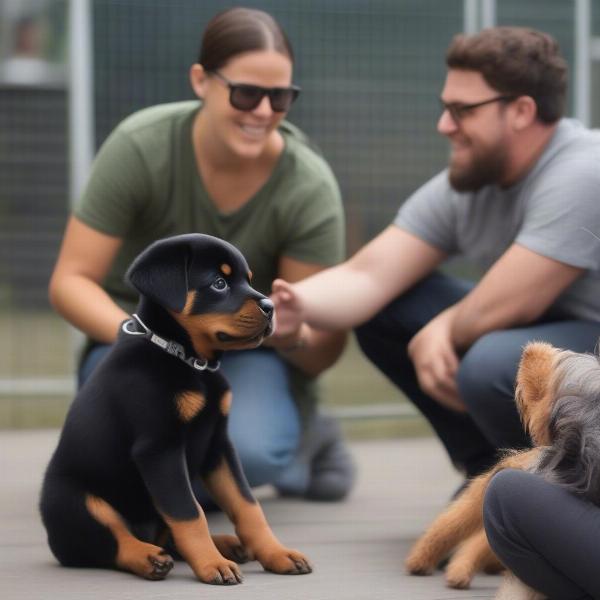Rottweiler dog bites are a serious topic that requires careful consideration and understanding. This article aims to delve into the reasons behind Rottweiler bites, how to prevent them, and what to do if you are bitten. We’ll explore the breed’s temperament, training techniques, responsible ownership, and the importance of socialization.
Decoding Rottweiler Behavior: Why Do They Bite?
It’s crucial to remember that any dog can bite, regardless of breed. However, due to their size and strength, Rottweiler bites can cause significant damage. They aren’t inherently aggressive, but certain factors can contribute to biting behavior:
- Fear or Anxiety: A frightened or anxious Rottweiler may bite as a defensive mechanism. This can be triggered by unfamiliar people, loud noises, or stressful situations.
- Territoriality: Rottweilers can be protective of their home and family. They might bite if they perceive a threat to their territory or loved ones.
- Pain or Illness: A Rottweiler experiencing pain or discomfort may bite if touched in the affected area. This underscores the importance of regular veterinary checkups.
- Lack of Socialization: Puppies not properly socialized may develop fear-based aggression, increasing the likelihood of biting. Early exposure to various people, places, and sounds is crucial.
- Poor Training: A poorly trained Rottweiler may not understand boundaries or commands, leading to unwanted behaviors, including biting.
“Early socialization and consistent training are paramount in preventing aggression in Rottweilers,” says certified dog trainer, Sarah Miller, CPDT-KA. “These dogs thrive on structure and clear communication from their owners.”
Preventing Rottweiler Bites: Proactive Measures
Prevention is always better than cure. Here’s how to minimize the risk of Rottweiler bites:
- Socialization from Puppyhood: Expose your Rottweiler puppy to a variety of people, dogs, and environments from an early age. This helps them develop confidence and reduces fear-based aggression.
- Obedience Training: Enroll your Rottweiler in obedience classes. A well-trained dog is less likely to bite because they understand commands and boundaries. dog bite suit training
- Responsible Ownership: Provide your Rottweiler with proper exercise, mental stimulation, and a balanced diet. A happy and well-adjusted dog is less likely to exhibit aggressive behaviors.
- Supervise Interactions: Always supervise your Rottweiler around children and other animals. Never leave them unsupervised, especially with strangers.
- Recognize Warning Signs: Learn to recognize your Rottweiler’s body language. Signs of stress or aggression, such as growling, lip curling, or stiff posture, indicate a potential bite.
 Socializing a Rottweiler Puppy
Socializing a Rottweiler Puppy
What to Do if Bitten by a Rottweiler
If bitten by a Rottweiler, seek immediate medical attention, regardless of the severity. Document the incident thoroughly, including the owner’s information and the dog’s vaccination history. Report the bite to the appropriate authorities. rottweiler dog bite
Addressing Specific Scenarios: Common Questions
Can a Rottweiler kill a raccoon?
While a Rottweiler is certainly capable of inflicting serious injury on a raccoon, a fatal outcome isn’t guaranteed. can a dog kill a raccoon
What are the legal implications of a Rottweiler bite?
The legal consequences of a Rottweiler bite vary depending on local laws and the specific circumstances of the incident. beware of the dog signs
“It’s essential to remember that responsible ownership plays a crucial role in preventing dog bites,” emphasizes Dr. Emily Carter, DVM. “Understanding your Rottweiler’s individual needs and providing a safe and structured environment are key to responsible pet ownership.”
Conclusion: Fostering Responsible Rottweiler Ownership
Rottweiler bites can be prevented through responsible ownership, early socialization, and consistent training. Understanding their behavior, recognizing warning signs, and taking proactive measures are essential for a harmonious relationship with this powerful breed. Remember, a well-trained and socialized Rottweiler can be a loving and loyal companion.
FAQ
- Are Rottweilers naturally aggressive? No, Rottweilers are not inherently aggressive. Their temperament is influenced by genetics, upbringing, and training.
- How can I socialize my Rottweiler puppy? Expose your puppy to various people, dogs, and environments in a positive and controlled manner.
- What are the signs of an aggressive Rottweiler? Growling, lip curling, stiff posture, and staring are potential signs of aggression.
- What should I do if my Rottweiler bites someone? Seek immediate medical attention for the victim and report the incident to the authorities.
- Are Rottweilers good family dogs? With proper training and socialization, Rottweilers can be loving and protective family dogs.
- How much exercise does a Rottweiler need? Rottweilers require regular exercise, both physical and mental, to stay happy and healthy.
- Are there any breed-specific health concerns for Rottweilers? Yes, Rottweilers are prone to certain health issues, such as hip dysplasia and bloat. Regular veterinary checkups are crucial.
ILM Dog is your global resource for expert advice on dog care and breeding. We offer valuable insights into breed selection, health, training, nutrition, grooming, and much more. Whether you’re a seasoned dog owner or just starting your journey, ILM Dog provides the resources you need to ensure your canine companion thrives. Contact us at [email protected] or +44 20-3965-8624 for personalized guidance. Learn more about us at ILM Dog.